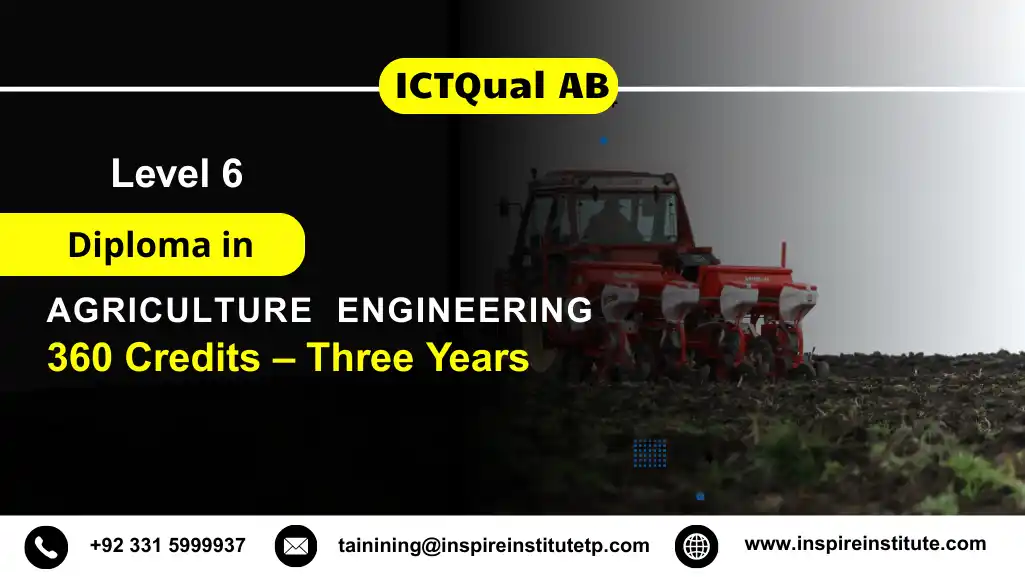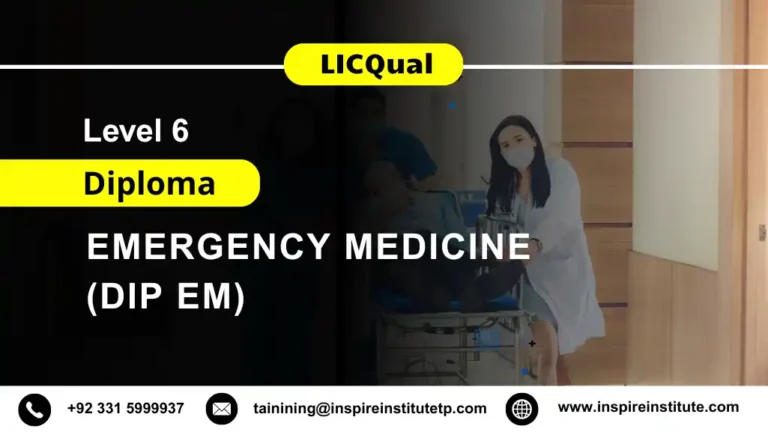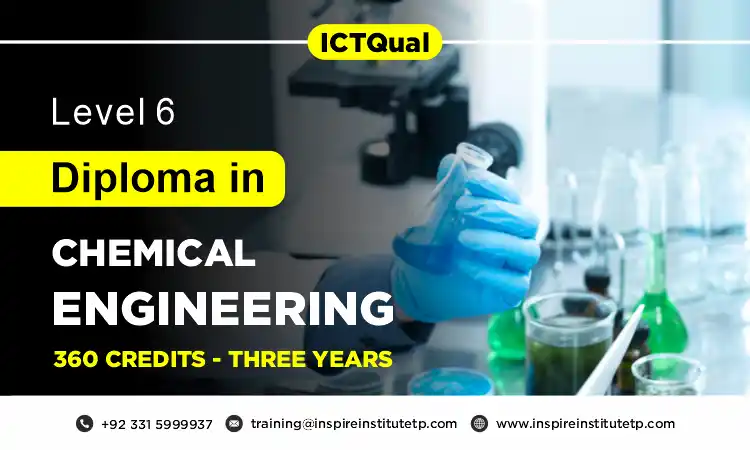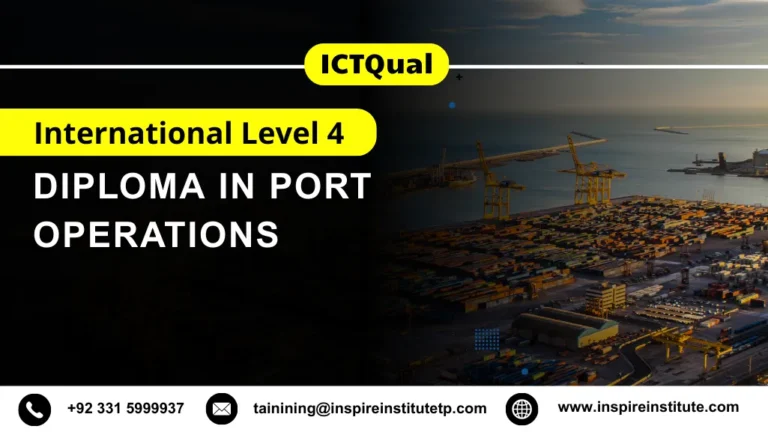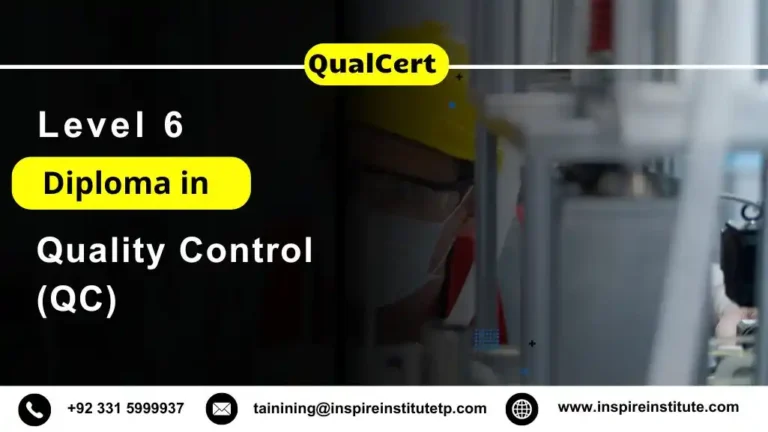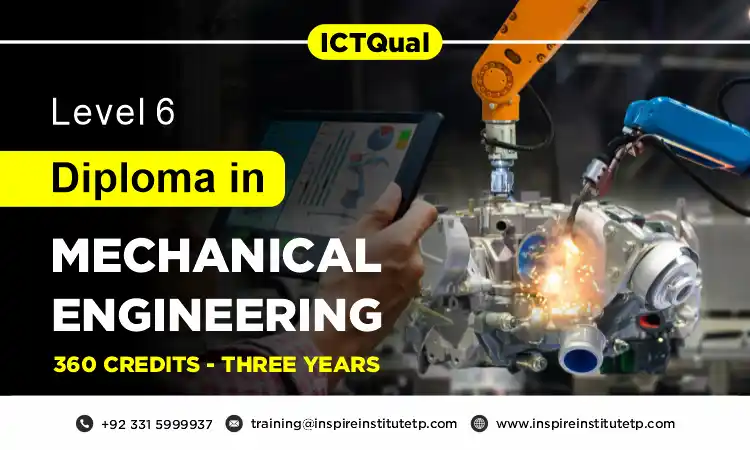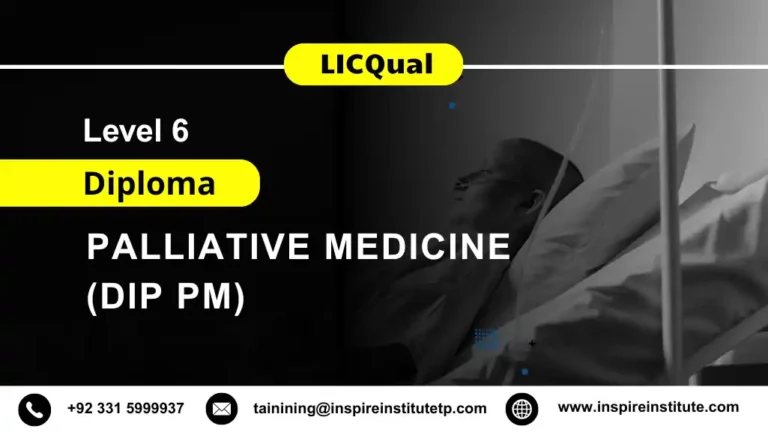ICTQual Level 6 Diploma in Agriculture Engineering 360 Credits – Three Years
The ICTQual Level 6 Diploma in Agriculture Engineering is a prestigious UK-recognised qualification, spanning three years and carrying 360 credits, designed to equip learners with advanced knowledge and practical expertise in agricultural systems, machinery, and engineering applications. This programme provides a comprehensive understanding of modern agricultural engineering, combining theoretical foundations with hands-on experience, enabling learners to implement innovative solutions for sustainable farming, mechanisation, irrigation systems, and agri-technology. It is ideal for both freshers seeking to build a solid career in agricultural engineering and professionals aiming to formalise and enhance their skills for leadership roles in the sector. The curriculum emphasises critical thinking, problem-solving, and applied research, preparing graduates to meet the challenges of modern agriculture and contribute effectively to agribusiness, food security, and rural development.
The course is structured to provide a strong grounding in core areas such as farm machinery design, irrigation and water management, soil conservation, crop production systems, and renewable energy applications in agriculture. Learners develop technical competencies alongside management skills, ensuring they can oversee agricultural projects, optimise processes, and adopt sustainable practices. The programme also integrates modules on safety, environmental considerations, and innovative technologies, enabling graduates to work confidently within diverse agricultural and engineering contexts.
For freshers, the diploma offers an entry pathway into agricultural engineering, equipping them with essential technical knowledge and practical skills to pursue roles such as farm equipment engineer, irrigation specialist, agricultural project coordinator, or research assistant. Experienced professionals can benefit from formal recognition of their expertise, enhance their strategic and operational capabilities, and progress into senior management, consultancy, or technical advisory roles within agricultural enterprises, governmental organisations, or research institutions.
The ICTQual Level 6 Diploma in Agriculture Engineering emphasises applied learning through case studies, practical projects, and field-based assignments. This approach ensures learners can translate theoretical knowledge into real-world solutions, making them valuable contributors to the efficiency, sustainability, and innovation of the agricultural sector. Graduates are prepared to navigate complex technical challenges, adopt new technologies, and implement engineering solutions that drive productivity and environmental stewardship.
Ultimately, this diploma offers a professional and flexible pathway for learners at all stages of their careers. It strengthens employability, supports career advancement, and equips graduates with the technical, analytical, and managerial skills required to excel in agricultural engineering and contribute meaningfully to the development of sustainable agriculture on both national and international scales.
Why Choose this Qualification
The ICTQual Level 6 Diploma in Agriculture Engineering is a prestigious and UK-recognised qualification designed to provide learners with advanced technical knowledge and practical skills for professional advancement in the agricultural engineering sector. Spanning three years and carrying 360 credits, this diploma equips learners with a comprehensive understanding of farm machinery, irrigation systems, soil and water management, crop production technologies, and sustainable agricultural practices. By blending academic theory with hands-on learning, the programme ensures learners gain strong analytical, problem-solving, and engineering application skills relevant to modern agriculture. It caters to both fresh learners seeking a solid foundation in agricultural engineering and professionals aiming to formalise their expertise, enhance their qualifications, and progress into senior technical or managerial roles. Graduates emerge ready to lead in farm mechanisation, irrigation management, agri-business development, and consultancy, contributing effectively to sustainable agricultural practices and technological innovation.
Key Reasons to Choose This Qualification:
Global Recognition:
- Internationally accredited and respected across the agricultural engineering sector.
- Provides credibility with agricultural equipment manufacturers, consultancies, and research organisations.
- Enhances career mobility with recognition in domestic and international markets.
- Offers a versatile qualification suitable for diverse professional pathways in agriculture and engineering.
Comprehensive Technical Competencies:
- Covers farm machinery design, irrigation and drainage systems, renewable energy applications in agriculture, and soil and crop management.
- Includes applied projects, laboratory simulations, and field-based exercises.
- Builds a thorough understanding of agricultural systems, precision farming technologies, and sustainable practices.
- Equips learners to implement innovative engineering solutions in agricultural settings.
Strategic Career Development:
- Trains learners to analyse and optimise complex agricultural systems and processes.
- Strengthens critical thinking, problem-solving, and decision-making skills.
- Prepares graduates for roles in agri-business management, equipment design, irrigation consultancy, and R&D.
- Ensures learners can drive operational efficiency, sustainability, and innovation in professional settings.
Practical Application of Engineering Knowledge:
- Focuses on case studies, field projects, and applied research tasks.
- Bridges theoretical learning with practical engineering solutions.
- Enhances technical, analytical, and project management abilities.
- Prepares learners to meet real-world challenges in modern agriculture.
Industry-Relevant Curriculum:
- Designed in line with international agricultural engineering standards and best practices.
- Addresses contemporary challenges such as precision agriculture, climate-smart farming, and sustainable irrigation.
- Provides insights into machinery safety, quality assurance, and environmental management.
- Ensures learners are adaptable to evolving agricultural trends and technological advancements.
Career Advancement Opportunities:
- Offers progression to postgraduate engineering qualifications and professional certifications.
- Opens career paths in agri-business consultancy, equipment design, irrigation management, R&D, and technical leadership.
- Provides opportunities in corporate, governmental, and research organisations.
- Offers flexibility for learners to tailor their career path according to technical and professional ambitions.
The ICTQual Level 6 Diploma in Agriculture Engineering empowers learners to become skilled, innovative, and globally recognised engineering professionals. Over three years, graduates gain a strong foundation in agricultural systems and practical competencies that enhance employability. The diploma prepares learners to tackle technical challenges with confidence, contribute to sustainable farming, and drive technological advancement in the agricultural sector, while providing a pathway for higher academic and professional progression.
Course Overview
UK based Qualification
Study Units: 36 Units
Evidence & Assignment Based
Course Level: Level 6
Qualification Structure
This qualification, the ICTQual Level 6 Diploma in Agriculture Engineering 360 Credits – Three Years, consists of 36 mandatory units.
Year 1: Foundational Knowledge
- Introduction to Agricultural Engineering
- Basics of Soil Science
- Plant Science and Crop Physiology
- Introduction to Farm Machinery
- Principles of Irrigation and Drainage
- Environmental Science in Agriculture
- Mathematics for Engineers
- Fundamentals of Agricultural Economics
- Introduction to Renewable Energy in Agriculture
- Agricultural Chemistry
- Engineering Drawing and CAD
- Workshop Practices in Agricultural Engineering
Year 2: Intermediate Concepts and Applications
- Advanced Soil and Water Management
- Farm Power and Mechanization
- Agricultural Structures and Materials
- Irrigation Systems Design
- Introduction to Precision Agriculture
- Agricultural Waste Management
- Crop Protection Technologies
- Advanced Farm Machinery Operations
- Principles of Agro-Processing
- Renewable Energy Technologies in Agriculture
- Land Surveying and Mapping
- Practical Training in Agricultural Engineering
Year 3: Advanced Studies and Specialization
- Sustainable Agriculture Practices
- Advanced Irrigation and Drainage Engineering
- Farm Business Management
- Design of Agricultural Machinery
- Precision Farming Systems
- Advanced Soil Mechanics
- Climate-Smart Agriculture
- Renewable Energy Systems for Farms
- Post-Harvest Technology
- Automation in Agriculture
- Research Methods in Agriculture Engineering
- Final Project in Agricultural Engineering
Who Should Take This Course
The ICTQual Level 6 Diploma in Agriculture Engineering is a prestigious, UK-recognised three-year qualification carrying 360 credits, designed to provide learners with advanced technical knowledge, practical skills, and professional expertise in agricultural systems, farm machinery, irrigation, soil and water management, and sustainable farming practices. This programme equips both fresh learners and experienced professionals with the analytical, problem-solving, and engineering skills required to excel in agricultural engineering, agri-business management, research and development, and consultancy. By combining theoretical frameworks with hands-on application, it prepares graduates to interpret, implement, and innovate agricultural engineering solutions in both domestic and international contexts. It is an ideal choice for learners aiming to build careers in agricultural engineering, strengthen their qualifications for senior technical or managerial positions, or pursue further academic progression in engineering and related disciplines.
Ideal Candidates for This Course:
University Graduates and Freshers:
Ideal for learners who have completed higher secondary or undergraduate studies.
Builds a strong foundation in key areas such as farm machinery, irrigation systems, soil and water management, and crop production technologies.
Introduces emerging practices including precision farming, renewable energy applications, and sustainable agricultural engineering methods.
Encourages development of critical thinking, technical problem-solving, and project management skills.
Provides an entry route into professional agricultural engineering careers.
Equips learners with transferable skills applicable across research, consultancy, and agri-business roles.
Aspiring Agricultural Professionals:
Designed for those aiming to pursue careers in agricultural machinery design, irrigation management, farm operations, R&D, or consultancy.
Provides in-depth understanding of engineering principles, production processes, and quality assurance in agriculture.
Strengthens knowledge in system optimisation, machinery maintenance, and sustainable practices.
Trains learners in applied engineering projects and field-based problem-solving.
Develops ability to address complex technical challenges in both domestic and international agricultural contexts.
Prepares graduates for professional roles requiring credibility and practical engineering expertise.
Experienced Professionals:
Tailored for agricultural engineers, technicians, farm managers, and R&D specialists.
Enables professionals to upskill and formalise existing technical expertise.
Offers global recognition, enhancing opportunities in international agricultural and engineering sectors.
Provides strategic insights into leadership, project management, and advanced agricultural engineering practices.
Encourages career progression into senior technical or managerial roles.
Supports continuing professional development with an accredited framework.
Career Changers:
Suitable for professionals from non-agricultural backgrounds seeking a career shift into agricultural engineering or farm technology.
Provides structured knowledge to transition into machinery design, irrigation consultancy, or sustainable farming projects.
Builds transferable analytical, technical, and problem-solving skills relevant across sectors.
Equips learners with practical tools for entering engineering, agronomy, or consultancy roles.
Offers credibility for professionals wishing to diversify their career paths.
Creates opportunities to explore agricultural consultancy, technical leadership, or innovation-driven projects.
Entrepreneurs and Leaders in Agricultural Management:
Ideal for business owners, managers, and organisational heads overseeing farm operations, agri-business, or engineering projects.
Strengthens understanding of machinery management, quality assurance, and technical compliance.
Enhances decision-making by applying engineering knowledge in operational and strategic contexts.
Provides skills for managing machinery design, irrigation initiatives, and sustainable agricultural projects.
Prepares leaders to influence organisational strategy through a strong technical foundation.
Builds credibility for entrepreneurs operating in international or regulatory agricultural environments.
Learners Planning Further Study:
Offers a solid platform for learners aspiring to pursue postgraduate engineering qualifications.
Provides eligibility for advanced diplomas, professional certifications, and internationally recognised engineering credentials.
Strengthens academic skills such as technical research, system analysis, and innovation strategy.
Encourages learners to specialise in areas like irrigation systems, renewable energy in agriculture, or farm mechanisation.
Equips students with the academic credibility required for higher-level study.
Prepares graduates for entry into advanced technical roles, research, or agricultural consultancy.
The ICTQual Level 6 Diploma in Agriculture Engineering provides a flexible and professional pathway tailored to a wide range of learners. It balances theoretical knowledge with applied practice, ensuring graduates develop robust engineering reasoning, technical skills, and analytical capabilities. With international recognition, the diploma unlocks opportunities for senior roles in agricultural engineering, machinery design, irrigation consultancy, R&D, and agri-business management. It also acts as a bridge for learners seeking advanced academic progression in engineering and related disciplines. Ultimately, this diploma equips graduates with the professional credibility, technical grounding, and practical expertise needed to thrive in the agricultural engineering industry and contribute meaningfully to sustainable agriculture, innovation, and technological advancement at both national and global levels.
Certification Route
The ICTQual Level 6 Diploma in Agriculture Engineering is a prestigious, UK-recognised three-year qualification carrying 360 credits, designed to provide learners with comprehensive technical knowledge, practical skills, and professional expertise in agricultural systems, farm machinery, irrigation, soil and water management, and sustainable farming practices. This programme is suitable for both fresh learners and experienced professionals, equipping them with the analytical, problem-solving, and hands-on competencies required to excel in agricultural engineering, farm operations, R&D, and consultancy roles. By combining theoretical instruction with practical application, it prepares graduates to implement, optimise, and innovate engineering solutions in domestic and international agricultural contexts. The diploma also offers pathways for career advancement, professional recognition, and further academic progression in engineering and related fields.
Route for Candidates with No Experience
This pathway is designed for learners who are new to the agriculture field and do not have prior professional experience.
- Admission: Candidates enrol at an ICTQual approved training centre to begin the structured three-year programme.
- Training: Learners complete all 36 study units over three years, integrating theoretical instruction, practical exercises, workshops, project work, and research-based tasks.
- Assessment: Learners are evaluated through assignments, technical projects, presentations, and examinations aligned with the programme learning outcomes.
- Certification: Upon successful completion of all assessments and training, learners are awarded the ICTQual Level 6 Diploma in Agriculture Engineering.
Route for Experienced and Competent Candidates
This route is designed for professionals with verified experience in agriculture engineering or related fields.
- Eligibility: Applicants must provide evidence of at least six years of relevant professional experience, including roles in farm machinery management, irrigation systems, crop production, or agricultural R&D.
- Assessment of Competence: Experienced learners may bypass full training and undergo structured assessment to validate existing knowledge and skills.
- Evidence Submission: Documentation such as job roles, responsibilities, project work, and prior experience must be submitted to demonstrate competence.
- Knowledge and Understanding: Centres may perform a skills gap analysis to determine if any additional training is required to meet all programme learning outcomes.
- Certification: Once experience and competence are verified, learners are awarded the ICTQual Level 6 Diploma in Agriculture Engineering without completing the full three-year programme.
This dual-route approach ensures flexibility and accessibility for both new learners and seasoned professionals. Fresh learners gain a structured, comprehensive education, while experienced individuals can formalise and validate their expertise. The diploma strengthens technical competence, enhances employability, and equips graduates with the practical, analytical, and engineering skills needed to excel in the agriculture sector and contribute to sustainable innovation and development globally.
Eligibility Criteria
The ICTQual Level 6 Diploma in Automotive Engineering is designed to accommodate a wide range of learners, from freshers with minimal experience to seasoned professionals seeking formal recognition of their expertise. This UK-recognised, three-year programme ensures that all candidates acquire the technical knowledge, practical skills, and analytical competencies required to succeed in the automotive engineering industry. To maintain high professional and academic standards, the programme specifies clear entry requirements that consider educational background, prior experience, age, and language proficiency. These requirements are structured to provide accessibility while ensuring candidates are well-prepared to meet the rigorous demands of the course.
Minimum Age:
There is no strict upper age limit; the programme welcomes learners of all ages who meet the educational and professional criteria.
Educational Background:
Applicants should have completed higher secondary education (A-levels, 12th grade, or equivalent) or hold an undergraduate degree in engineering, mechanical studies, or a related discipline. Freshers from non-engineering backgrounds with strong aptitude in mathematics and science may also be considered.
Professional Experience:
Candidates with little to no professional experience in automotive engineering can enrol, provided they meet the educational prerequisites. The course will equip them with the technical, practical, and analytical skills needed to excel in the industry.
Experience Professionals Candidates with at least six years of verified experience in automotive engineering, vehicle maintenance, manufacturing, R&D, or related fields may qualify for an accelerated route. They must provide evidence of their professional competence, including job roles, projects, and technical achievements aligned with the programme’s learning outcomes.
Language Proficiency:
All learners must demonstrate proficiency in English, both written and spoken, to successfully complete assessments and communicate effectively during practical and theoretical components of the course. IELTS 5.5 or equivalent is recommended for non-native English speakers.
Future Progression
The ICTQual Level 6 Diploma in Automotive Engineering equips learners with advanced technical knowledge, practical skills, and analytical competencies across automotive systems, vehicle design, engine technology, diagnostics, and maintenance management. By combining structured theoretical study with hands-on practical experience, this programme prepares participants to design, maintain, and optimise automotive systems, solve engineering problems, and implement innovative solutions in both domestic and international contexts. It also offers opportunities for career progression, professional recognition, and further academic advancement in automotive engineering, mechanical systems, and industrial technology.
Career Opportunities
Engineering and Technical Roles: Qualify for positions such as Automotive Engineer, Vehicle Design Specialist, Mechanical Systems Engineer, Maintenance Manager, or Automotive Consultant within manufacturing firms, automotive service centres, and research organisations.
Immediate Workplace Application: Apply practical skills in areas such as engine diagnostics, vehicle maintenance, system optimisation, technical reporting, and project management.
Enhanced Employability: Earn a UK-recognised qualification that strengthens professional credibility and opens opportunities in automotive design, engineering consultancy, manufacturing, and industrial technology sectors.
Progression to Higher-Level Qualifications
Advanced Diplomas and Certifications: Progress towards specialised qualifications in automotive design, mechanical engineering, advanced diagnostics, or industrial management.
Specialisation Pathways: Focus on areas such as electric and hybrid vehicles, automotive safety systems, advanced manufacturing processes, or vehicle performance analysis.
Academic Advancement: Build a pathway to postgraduate studies, including MSc or MEng programmes in Automotive Engineering, Mechanical Engineering, or Vehicle Technology.
Long-Term Professional Development
Career Growth: Advance into senior-level roles such as Lead Automotive Engineer, Technical Project Manager, R&D Engineer, or Automotive Systems Consultant.
Industry-Relevant Skills: Stay updated with emerging automotive technologies, electric vehicle systems, manufacturing standards, diagnostics, and quality control practices.
Entrepreneurial Opportunities: Use expertise to launch automotive service businesses, provide consultancy on vehicle design and maintenance, or lead innovation projects in automotive technology.
The ICTQual Level 6 Diploma in Automotive Engineering provides immediate professional benefits while offering a structured pathway for long-term career growth, academic advancement, and leadership success in automotive engineering and industrial technology. It equips graduates with the practical, technical, and analytical skills required to excel in complex engineering environments and contribute meaningfully to automotive innovation and industrial development globally.

